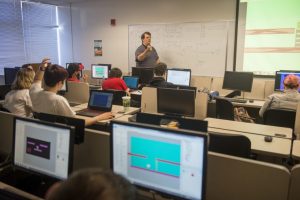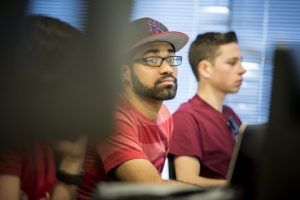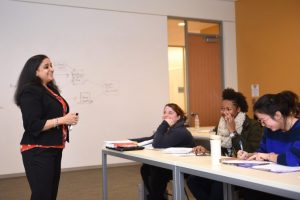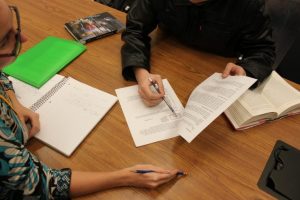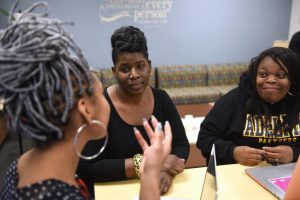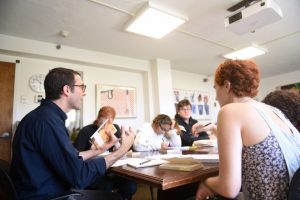PATH Course Requirements (Distribution) and Learning Goals
Learn more about PATH general education requirements, learning goals, and the different courses you can take to complete your PATH learning at Adelphi.
PATH General Education Course Requirements
The Arts (A) provide unique opportunities for self expression, processing experiences, and sharing ideas with others. The study of any art form, at any level, requires practice, discipline, and attention to detail. It emphasizes creative approaches to problems and challenges, and cultivates the appreciation of multiple perspectives on all issues, large and small, personal and universal.
Outcomes
Expected outcomes from Arts courses are as varied as the arts themselves. For example:
- You will understand why a painter considers choices about color, light, and perspective in a composition
- You will understand why an actor imagines and makes decisions about the motives behind a character’s actions
- You will understand why a filmmaker writes, shoots, and edits many hours of footage down to a brief scene that tells a story in a very particular way
- You will understand why a dancer explores different ways of using movement to embody a particular emotion
- You will understand why a musician learns to perform a composition with both technical expertise and emotional impact
- You will understand how artistic creations can facilitate dialogue about important social issues
Humanities (H) courses will give you critical reading and critical thinking skills to interpret the many ways people express their experiences and beliefs now and throughout our history. These include works of philosophy, literature, history, and the arts as well as media from across cultures and across centuries. In a Humanities course, you develop your own written and communication skills while engaging actively with these works. Humanities courses give you the time and space for your interpretations, knowledge, and experiences to enter into intellectual conversations on topics that have been ongoing for years. Ultimately, the Humanities help you to explore the diverse ways humans make meaning of the world and our place in it. The skills developed in Humanities courses are those valued by employers across a wide range of fields, including education, the arts and arts administration, libraries and publishing, law, business, healthcare, journalism and media. Indeed strong communication skills, exposure to different ways of thinking, critical and creative thinking skills open up numerous opportunities for our students.
Outcomes
- You will be able to use critical reading skills, which include slow and attentive reading, reading with an open mind, questioning your own assumptions, distinguishing between unsupported general claims and ideas supported by specific details of evidence, and annotating and note taking.
- In written assignments and classroom discussions, you will be able to interpret challenging texts and explain your responses and ideas. You will also be able to develop your own ideas, utilizing both critical and creative modes of thinking and expression.
- In your encounters with a world of multiple, complex, and conflicting ideas in Humanities texts, you will be able to deepen your understanding of the uniqueness and complexity of other people and engage more deeply with others as you move through college and life.
Mathematics, Computing, and Logic (MCL) courses help you build arguments to support your opinions and actions in the real world. You will develop analytical skills through the practice of quantitative or symbolic reasoning. Your courses will focus on presentation and evaluation of evidence and argument; understanding the use and misuse of data; and organization of information. This coursework complements the critical thinking skills taught in other PATH courses. MCL courses provide students with essential skills in problem-solving, critical thinking, and analytical reasoning, which are highly valued in a wide range of industries and professions.
Outcomes
- You will be able to formulate and solve problems that rely on mathematical or logical reasoning.
- You will be able to identify arguments and claims from others that rely on quantitative evidence and mathematical or logical reasoning.
- You will be able to evaluate the appropriateness of conclusions drawn from these reasoning techniques.
Natural science (NS) courses will help you utilize the scientific method – careful observation and experimentation, coupled with reasoning and quantitative analysis – to explain and predict phenomena in the natural world. In a Natural Science course, you will develop your data analysis and scientific reasoning skills while learning what scientists have discovered about our world: the universe, living organisms, geology, climate, and ecosystems, among many others. The skills developed in a Natural Science course will enable you to succeed in all professions that involve scientific methods, including healthcare, education, research, business, psychology and many others. These courses will help you become a knowledgeable citizen of your community.
Outcomes
- You will be able to understand and evaluate scientific evidence based on accepted principles of experimental design, data analysis, and reproducibility.
- You will be able to solve problems or analyze issues by applying the scientific method scientific reasoning to data from the natural world
- You will be able to distinguish the difference between facts, opinion, and beliefs in scientific issues.
The Social Sciences (SS) are primarily concerned with human social structures, processes, systems, and institutions. Courses that meet this requirement seek to discover, examine, and/or to explain the dynamics of human behavior, advancing our awareness and understanding of the interactions between and among people and society, and how each influences, and is influenced by the other.
PATH General Education Learning Goals
As you take different courses to complete your PATH journey, you will also be meeting important overall Learning Goals.
Why quantitative reasoning?
You’ll find many uses for quantitative reasoning:
- justifying data-based decisions
- encoding and protecting information
- managing the treatment of disease
- providing a unified understanding of the forces of nature
- formulating government and international policies.
Why is quantitative reasoning important to know?
Developing the capacity for quantitative reasoning helps you think about and engage with numerical data across academic disciplines and interdisciplinary programs. Once you develop strong quantitative reasoning skills, you can:
- gather and evaluate data
- raise relevant questions
- build sound arguments
- weigh alternative evidence and reasoning
- generate and test any hypothesis
- compare and interpret texts
- become a rigorous, versatile, agile thinker
Global Learning and Civic Engagement (G) comprise one learning goal with two distinct paths toward the same ultimate end: encouraging engagement and intercultural awareness among Adelphi undergraduates. Students may take two Global Learning, two Civic Engagement, or one of each.
Global Learning Courses
Courses meeting the Global Learning goal focus on global connectedness of human societies and their environments. In these courses, you will analyze the diverse and complex links between communities through many lenses: historic, social, cultural, linguistic, environmental, political, economical, physical, and philosophical. Your assignments will assess your understanding of these issues.
Civic Engagement Courses
Courses meeting the Civic Engagement learning goal focus on the idea of the individual’s responsibility to the community. In these courses, you will learn to understand the potential and real consequences of intercultural engagement with different individuals and groups. You’ll learn how to interact with other communities, and you will raise your own awareness and understanding of other communities. You’ll learn different approaches to civic engagement — historical, contemporary and theoretical — and you’ll address the importance of philosophical, ethical and moral issues within civic engagement.
As part of your journey along the Adelphi PATH. Program, you will take one course in Information Literacy. Information is used for many different purposes. In our knowledge-based society, it is important that you know how to find information, determine whether information is trustworthy as well as to know how to use information ethically.
Why is the study of information so important?
You will learn to:
- evaluate information
- use information honestly
- avoid plagiarism
- effectively and appropriately use technology to gather and evaluate sources
- use information in new ways that technology makes possible
Information Literacy prepares you to navigate the personal, professional, and academic research challenges of the modern world.
Entering college is like joining a number of long-running conversations on a wide variety of topics. Everyone who joins our University community is invited and expected to participate. These conversations take place in many forms including:
- writing
- speaking
- audio-visual presentations on books, articles, websites, blogs, discussion boards, and the like.
Learn to express yourself
In your Communication courses (both Communication – Oral and Communication – Written) you will learn to express yourself within the various disciplines studied at the University. You will set a foundation for your future as a professional in your chosen field and become a contributing member of any community that values communication and self-expression.
The goal in these classes is always to learn how best to communicate your ideas to your audience, respecting and engaging the voices of others while remaining true to your own voice.
Learn to communicate your ideas
In your Communication – Written/Oral courses, you will learn and practice skills for generating ideas:
- develop questions worth pursuing and answering
- use sources of information and the ideas of others to further your own thinking
- understand the relationship between thesis and evidence
- strive for creative, complex and compelling arguments, narratives and lines of thought
Gain a deeper understanding of who you are
You will learn about the self:
- reflect about ways communication and identity are intimately connected
- interact with others to interrogate your own assumptions
- develop generous habits of intellectual exchange, including engagement in dialogue and giving and receiving feedback
Learn helpful communication strategies
You will develop communication strategies:
- believe your ideas matter and communicate with conviction
- engage and integrate sources of evidence and others’ ideas in communicating
- acknowledge the diverse perspectives, abilities and life experiences of your audience
- find the best media and design platforms to convey ideas to specific audiences
- ensure communication media are accessible for diverse audiences
- recognize the formal expectations within specific rhetorical situations

